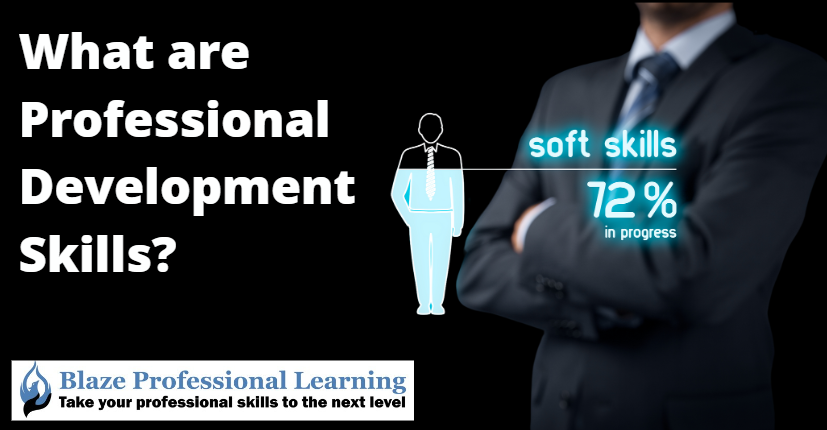
The Definition of Professional Development Skills
Professional Development Skills refers to the knowledge, abilities, and techniques which can assist you in progressing and succeeding in your career. They play a critical role in personal and career growth and development as they allow you to reach your goals more easily and better perform in your current role. Increasing or extending your Professional Development Skills also makes you more suited as a candidate for other roles, even those that are more senior.
Professional development skills play an essential role in today's highly competitive job market, helping individuals to be more productive, efficient, and effective at work.
In this article we will examine both their importance and ways they can be developed.
Why Are Professional Development Skills Essential?
1. Get Ahead of the Competition
Professional development skills help ensure you remain valuable to potential employers and remain relevant in the job market. By improving your skills continuously, you remain competitive in this area of employment.
2. Increase Your Earning Potential
Individuals with professional development skills tend to earn higher salaries. Employers tend to reward individuals who possess up-to-date knowledge and abilities in their field.
3. Increase Your Confidence
Professional development skills give you more self-assurance in your abilities and allow you to handle challenging tasks more easily, leading to career advancement.
4. Enhance Your Employability
Professional development skills make you more employable. Employers tend to favor individuals willing to learn and develop as well as possessing the tools needed for success in their chosen field.
Examples of Professional Development Skills Available Today
Professional development skills depend heavily on your industry or field of work; however, certain abilities are valued across industries and spheres of endeavor. Here are a few examples of valuable professional development abilities:
1. Leadership Skills
Leadership skills refer to the ability to guide, motivate, and inspire others towards a shared goal. This involves skills such as communication, decision-making and problem-solving.
2. Communication Skills
Communication skills are integral in any job environment and include listening actively, speaking clearly and concisely, and writing efficiently.
3. Time Management Skills
Time management skills involve prioritizing tasks, setting deadlines and organizing your day efficiently.
4. Analytical Skills
Analytical skills refer to the ability to interpret, and evaluate data in order to make informed decisions.
4. Technical Skills
Technical skills refer to the skills necessary for performing any task or job. For instance, a web developer needs technical abilities such as programming languages, web development frameworks and database administration in order to complete his/her duties successfully.
6. Interpersonal Skills
Interpersonal skills refer to the ability to work effectively with others and include teamwork, conflict resolution and networking abilities.
How Can You Develop Professional Development Skills?
Building professional development skills takes effort and determination. Here are a few steps you can take to develop them:
A. Establish Your Goals
Determine the skills necessary to reach your career goals. Take into account both those required for your current role, as well as those that could lead to future opportunities.
B. Enroll in Training Courses
Utilise training courses and workshops offered by your employer, industry associations or online platforms. These can help develop new skills or hone existing ones.
C. Seek Mentorship
Seeking mentoring can help guide your career growth. A mentor can offer invaluable advice, share their knowledge and expertise, and assist in the development of new skills.
D. Join Professional Associations
Join professional associations related to your field for networking opportunities, access to events and resources in your industry, training and development programs and professional advancement.
E. Read Broadly
You should regularly update yourself on topics relevant to your field by reading widely on them and staying abreast of trends, news, and research in it.
F. Practice Regularly
Maintain and enhance your skills continuously through practice and feedback from colleagues, supervisors or mentors in order to identify areas for growth.
Conclusion
Professional development skills are vital to both personal growth and career advancement. By setting goals, taking training courses, finding mentoring relationships, joining professional associations, reading widely and practicing regularly, professional development can provide you with the foundational tools for a prosperous career in any field.
Professional development is an ongoing journey, and something you often need to take charge of yourself. Putting in the time now to upskill yourself or to benefit your self development and hone your skills will likely bring positive returns in the form of better employment prospects, enhanced career options, and less stress (and more enjoyment) in your current role.
FAQs About Professional Development Skills
Skills in high demand vary depending on the industry and job market, but some examples include data analysis, digital marketing, project management and cybersecurity.
Professional development skills can help you enhance the performance and productivity in your current role. By taking on more challenging tasks and responsibilities, contributing more to the organization and demonstrating your value to employers, these abilities can enable you to become more efficient and increase performance and productivity at work.
Yes, there are numerous free resources available for professional development skills development. You can access online courses, webinars, and workshops offered by professional associations, industry organizations, and educational institutions.
Measuring progress can be done through setting goals, tracking achievements and seeking feedback from colleagues and supervisors. Other tools for measuring progress include performance evaluations, self-assessments and skill tests.
Employers have the responsibility of offering opportunities and resources for employee professional development. This may involve training programs, mentoring opportunities and coaching support as well as career development plans.
Staying motivated means setting clear goals, recognizing and capitalizing on your strengths, seeking out new challenges and celebrating your accomplishments. Additionally, engagement with work should remain high so as to maximize opportunities for growth and development.


